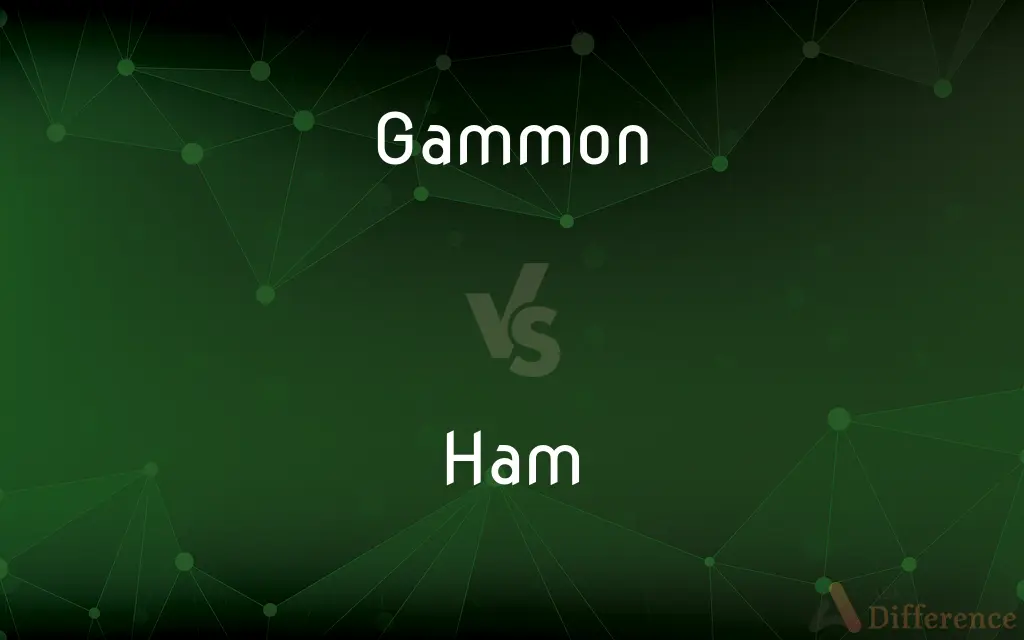Gammon vs. Ham — What's the Difference?
By Fiza Rafique — Updated on September 21, 2023
Gammon refers to a specific cut of pork that is cured but generally not cooked, while Ham is a leg cut that has been both cured and cooked. They come from the same part of the pig but differ in preparation.

Difference Between Gammon and Ham
Table of Contents
ADVERTISEMENT
Key Differences
Gammon is a hind leg of pork that has been cured in a similar fashion to bacon. Unlike Ham, which is also a cured leg of pork, Gammon is usually sold raw and requires cooking before consumption.
Ham, on the other hand, is generally already cooked or smoked when you buy it. It can be eaten as is, although many people choose to bake or glaze it further. In contrast, Gammon needs to be cooked and is often boiled before being baked or grilled.
While Ham is ready to eat and is often seen on the table for holidays and special occasions, Gammon is more versatile because it starts off uncooked. You can prepare it in a variety of ways, giving you more flexibility than pre-cooked Ham.
Another key difference is geographical preference. Gammon is a term more commonly used in the United Kingdom, whereas Ham is universally understood and consumed around the globe.
In essence, while both Gammon and Ham come from the hind leg of a pig and are cured, they differ primarily in their cooking state at the time of purchase and their cultural relevance.
ADVERTISEMENT
Comparison Chart
State at Purchase
Usually raw
Usually cooked or smoked
Cooking Required
Yes
Optional
Part of Pig
Hind leg
Hind leg
Common Locale
United Kingdom
Global
Versatility
High
Lower
Compare with Definitions
Gammon
Versatile meat requiring cooking.
Gammon can be prepared in various ways.
Ham
A cut of pork leg that is cured and cooked.
We had ham for Easter dinner.
Gammon
British term for a specific pork cut.
In the UK, gammon is a popular choice for holiday meals.
Ham
Usually precooked or smoked meat.
This ham is smoked for extra flavor.
Gammon
Often boiled before baking or grilling.
We usually boil the gammon before putting it in the oven.
Ham
Eaten globally, known universally.
Ham sandwiches are popular worldwide.
Gammon
Similar to ham but not precooked.
Gammon tastes similar to ham but allows for more cooking options.
Ham
Ham is pork from a leg cut that has been preserved by wet or dry curing, with or without smoking. As a processed meat, the term "ham" includes both whole cuts of meat and ones that have been mechanically formed.
Gammon
Ham which has been cured or smoked like bacon
Gammon steaks
Ham
(in the Bible) a son of Noah (Gen. 10:1), traditional ancestor of the Hamites.
Gammon
A victory in backgammon (carrying a double score) in which the winner removes all their pieces before the loser has removed any.
Ham
Overact
She hammed it up for the cameras
Gammon
Nonsense; rubbish
‘That's gammon,’ he said, ‘how much real money did you stump up?’
Ham
The thigh of the hind leg of certain animals, especially a hog.
Gammon
Defeat (an opponent) with a gammon.
Ham
A cut of meat from the thigh of a hog, often cured by salting or smoking.
Gammon
Hoax or deceive (someone)
You're gammoning me!
Ham
The back of the knee.
Gammon
A victory in backgammon reached before the loser has succeeded in removing a single piece.
Ham
The back of the thigh.
Gammon
Misleading or nonsensical talk; humbug.
Ham
Hams The buttocks.
Gammon
Gammon See Shelta.
Ham
A performer who overacts or exaggerates.
Gammon
A cured or smoked ham.
Ham
A licensed amateur radio operator.
Gammon
The lower part of a side of bacon.
Ham
To exaggerate or overdo a dramatic role; overact.
Gammon
To defeat in backgammon by scoring a gammon.
Ham
To exaggerate or overdo (a dramatic role, for example).
Gammon
To deceive or mislead
"[He] gammoned a countryman out of a good round sum of money" (Charles Dickens).
Ham
(anatomy) The region back of the knee joint; the popliteal space; the hock.
Gammon
To talk misleadingly or deceptively.
Ham
(countable) A thigh and buttock of an animal slaughtered for meat.
Gammon
To fasten (a bowsprit) to the stem of a ship.
Ham
(uncountable) Meat from the thigh of a hog cured for food.
A little piece of ham for the cat
Gammon
A cut of quick-cured pork leg.
Ham
The back of the thigh.
Gammon
(backgammon) A victory in backgammon achieved when the opponent has not borne off a single stone.
Ham
Electronic mail that is wanted; mail that is not spam or junk mail.
Gammon
(rare) Backgammon (the game itself).
Ham
Obsolete form of home
Gammon
(nautical) A rope fastening a bowsprit to the stem of a ship (usually called a gammoning).
Ham
(acting) An overacting or amateurish performer; an actor with an especially showy or exaggerated style.
Gammon
(dated) Chatter, ridiculous nonsense.
Ham
(radio) An amateur radio operator.
Gammon
A middle-aged or older right-wing, reactionary white man, or such men collectively.
Ham
(acting) To overact; to act with exaggerated emotions.
Gammon
To cure bacon by salting.
Ham
Home.
Gammon
(backgammon) To beat by a gammon (without the opponent bearing off a stone).
Ham
The region back of the knee joint; the popliteal space; the hock.
Gammon
To lash with ropes (on a ship).
Ham
The thigh of any animal; especially, the thigh of a hog cured by salting and smoking.
A plentiful lack of wit, together with most weak hams.
Gammon
To deceive; to lie plausibly to.
Ham
A person who performs in a showy or exaggerated style; - used especially of actors. Also used attributively, as, a ham actor.
Gammon
The buttock or thigh of a hog, salted and smoked or dried; the lower end of a flitch.
Ham
The licensed operator of an amateur radio station.
Gammon
Backgammon.
Ham
To act with exaggerated voice and gestures; to overact.
Gammon
A victory in the game of backgammon in which one player gammons another, i. e., the winner bears off all of his pieces before his opponent bears off any pieces; as, he won the match with three gammons in a row.
Ham
Meat cut from the thigh of a hog (usually smoked)
Gammon
An imposition or hoax; humbug.
Ham
(Old Testament) son of Noah
Gammon
To make bacon of; to salt and dry in smoke.
Ham
A licensed amateur radio operator
Gammon
To beat in the game of backgammon, before an antagonist has been able to get his "men" or counters home and withdraw any of them from the board; as, to gammon a person. In certain variants of the game one who gammons an opponent scores twice the normal value of the game.
Ham
An unskilled actor who overacts
Gammon
To impose on; to hoax; to cajole.
Ham
Exaggerate one's acting
Gammon
To fasten (a bowsprit) to the stem of a vessel by lashings of rope or chain, or by a band of iron.
Ham
Common holiday dish.
Ham is often served during Christmas.
Gammon
Meat cut from the thigh of a hog (usually smoked)
Ham
Can be eaten as is or cooked further.
This ham can be glazed and baked again for extra flavor.
Gammon
Hind portion of a side of bacon
Gammon
A cut of pork leg that is cured but uncooked.
I bought some gammon to boil and then bake for dinner.
Common Curiosities
Is Ham ready to eat?
Generally, yes. Ham is usually precooked or smoked.
What is Gammon?
Gammon is a cured but uncooked cut of pork leg.
What is Ham?
Ham is a cured and usually precooked or smoked cut of pork leg.
Do I have to cook Gammon?
Yes, gammon requires cooking before it can be eaten.
Can I glaze Ham?
Yes, ham can be glazed and baked further if desired.
Is Gammon similar to bacon?
Yes, gammon is cured similarly but is a larger cut.
Is Gammon a British term?
Yes, the term is more commonly used in the United Kingdom.
Can I bake Gammon?
Yes, gammon is often boiled and then baked.
Which is more versatile, Gammon or Ham?
Gammon is generally more versatile because it needs to be cooked.
Can I use Ham in sandwiches?
Yes, ham is commonly used in sandwiches.
Is Ham popular globally?
Yes, ham is eaten and recognized worldwide.
How do I cook Gammon?
Gammon is often boiled before being baked, grilled, or fried.
Can I grill Gammon?
Yes, gammon can be grilled after boiling.
Is Ham usually served at holidays?
Yes, ham is a common dish for special occasions and holidays.
Can I eat Ham cold?
Yes, since ham is usually precooked, it can be eaten cold.
Share Your Discovery

Previous Comparison
Ale vs. Stout
Next Comparison
Jv vs. VarsityAuthor Spotlight
Written by
Fiza RafiqueFiza Rafique is a skilled content writer at AskDifference.com, where she meticulously refines and enhances written pieces. Drawing from her vast editorial expertise, Fiza ensures clarity, accuracy, and precision in every article. Passionate about language, she continually seeks to elevate the quality of content for readers worldwide.











































